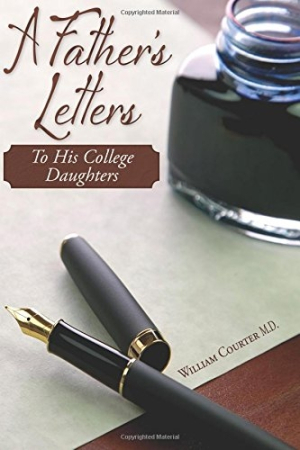A Father's Letters
To His College Daughters
A father emphasizes remaining true to oneself in this moving collection of letters to his college-aged daughters.
A Father’s Letters to His College Daughters by William Courter gathers insights, advice, and reflections from the pivotal years between the end of his daughters’ adolescence and the start of their adulthood. Published as an example for fellow parents facing a similar stage in life, the book encourages letting go of personal expectations and allowing children to choose their own paths.
With a brief preface to set the context, A Father’s Letters gathers e-mails from the years during which the author’s daughters attended college at New York University and the University of Southern California. These communications contain a mixture of pithy maxims—“Be safe. Be good. Be you.”—admissions of loneliness, travel plans, household events, inspiring quotes, and a strong belief in a hopeful future. They are at times repetitive, but often affectionate, self-aware, and wise.
Courter’s e-mails are occasionally interspersed with letters by his wife and notes penned during the girls’ childhoods. The book brims with pride in the girls’ achievements, while acknowledging that failures are not only acceptable, but a welcome part of a successful life. From practical problems such as difficult roommates, to deeper considerations such as learning for joy rather than in pursuit of a high-income career, these e-mails provide their recipients with necessary perspective while leaving decisions in their own hands.
Like most rewarding epistolary collections, the letters reveal as much about their author as they do about their addressees. Courter’s conviction that work isn’t the most important task in life is fed by a lifelong medical career. Such appealing messages may speak best to affluent audiences with financial safety nets already in place.
The letters remind the girls, time and again, to make the most of their college experiences outside of the classroom, through friendships and cultural experiences. The author’s own problems, which include elder care, model ways to maintain grace under pressure.
The most salient moments in the text veer away from lengthy preambles and everyday details, and draw from specific, vivid anecdotes. In one memorable instance, a slow-growing bamboo becomes a metaphor for reaping unseen rewards over time.
Other thoughtful inclusions provide a snapshot of an era. The author features a passage from his own mother’s diary, which lists the fashions of the forties, and indirectly reveals her concerns with appearance and marriageability—a sharp contrast to Courter’s own desire for his daughters to spend their time in college focusing on their educational passions first.
A fleeting mention of 9/11—in context of a father’s concern for his daughter’s late night outing at a risky locale—grounds the work in a troubled atmosphere. For the outsider gazing in, these details broaden an otherwise personal story.
With its focus on remaining true to one’s own principles, this collection of letters emphasizes the power of healthy, supportive family relationships.
Reviewed by
Karen Rigby
Disclosure: This article is not an endorsement, but a review. The publisher of this book provided free copies of the book and paid a small fee to have their book reviewed by a professional reviewer. Foreword Reviews and Clarion Reviews make no guarantee that the publisher will receive a positive review. Foreword Magazine, Inc. is disclosing this in accordance with the Federal Trade Commission’s 16 CFR, Part 255.

